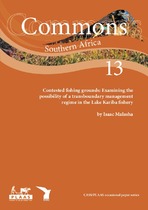| dc.contributor.author | Malasha, Isaac | |
| dc.date.accessioned | 2019-03-07T12:15:50Z | |
| dc.date.available | 2019-03-07T12:15:50Z | |
| dc.date.issued | 2005 | |
| dc.identifier.citation | Malasha, I., 2005. Contested fishing grounds: Examining the possibility of a transboundary management regime in the Lake Kariba fishery. Cape Town: Institute for Poverty Land and Agrarian Studies (PLAAS). | en_US |
| dc.identifier.uri | http://hdl.handle.net/10566/4428 | |
| dc.description.abstract | Community-based natural resources management (CBNRM) programmes in the southern African region emerged as a reaction to colonial ‘fortress’ conservation policies that criminalised and marginalised local people, preventing their use of natural resources. These colonial approaches did not lead to the sustainable use of the resources. They merely contributed to continued conflicts between government agents and local users. In the immediate post-colonial period very little was done to rectify these policies. It was only in the mid-1980s that a paradigm shift towards CBNRM began to occur. The political integration brought by the formation of the Southern African Development Community (SADC) presented favourable conditions for the scaling-up of these CBNRM initiatives. Transboundary natural resources management (TBNRM) projects began to be implemented in the joint-management of resources that straddle international boundaries. | en_US |
| dc.language.iso | en | en_US |
| dc.publisher | Institute for Poverty Land and Agrarian Studies (PLAAS) | en_US |
| dc.relation.ispartofseries | Commons South Africa;13 | |
| dc.subject | Fishing grounds | en_US |
| dc.subject | Transboundary | en_US |
| dc.subject | Lake Kariba | en_US |
| dc.subject | Fishery | en_US |
| dc.title | Contested fishing grounds: Examining the possibility of a transboundary management regime in the Lake Kariba fishery | en_US |
| dc.type | Book | en_US |

